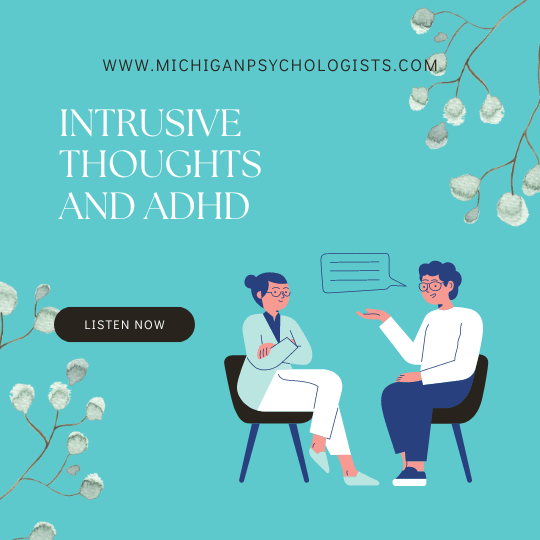Intrusive Thoughts and ADHD

Table of Contents
Hello, fellow brain explorers! Ever feel like your mind has a mind of its own, especially when it comes to those pesky, intrusive thoughts? Well, if you have ADHD, you know exactly what I’m talking about. Inspired by the wonderfully chaotic musings of Scott Adams, today we’re diving into the labyrinth of intrusive thoughts as they relate to ADHD. Buckle up and get ready for a fun, enlightening journey into the mind’s mischievous antics and how to tame them!
Why Are Intrusive Thoughts Persistent and Disruptive in People with ADHD?
Intrusive thoughts are like uninvited guests at a party—they show up out of nowhere and refuse to leave. For people with ADHD, these thoughts can be particularly persistent and disruptive due to differences in brain chemistry and function. ADHD affects the brain’s executive function, which includes managing attention, inhibiting inappropriate responses, and controlling impulses. This makes it harder for people with ADHD to filter out irrelevant thoughts and stay focused, causing intrusive thoughts to stick around like stubborn weeds in a garden.
Some Examples of Intrusive Thoughts in People with ADHD
“Did I lock the door?”
The hyperactive mind constantly questions itself, leading to repetitive, doubting thoughts.“I forgot something important!”
The chronic distractibility makes it easy to feel like something crucial has been missed.“Everyone thinks I’m weird.”
Social anxiety and impulsivity can fuel worries about how others perceive you.“I’ll never get anything done.”
Struggles with focus and time management lead to feelings of hopelessness about productivity.“I might have said something wrong.”
Overthinking past conversations can become a relentless cycle of self-doubt.“What if I fail?”
Fear of failure is magnified by the ADHD brain’s tendency to catastrophize.“I can’t stop thinking about that mistake.”
Ruminating on past errors is common due to difficulty moving on from negative thoughts.“I’m a burden to others.”
Feelings of inadequacy and guilt can arise from needing more help or attention.“Something bad is going to happen.”
Anxiety about the future can trigger a constant stream of worst-case scenarios.“I can’t do this.”
Self-doubt and low self-esteem are frequent companions, making challenges seem insurmountable.
What Do Intrusive Thoughts Mean?
Intrusive thoughts are involuntary and unwanted thoughts that can be distressing. They don’t necessarily reflect your true desires or intentions but are rather a byproduct of how your brain processes information and stress. For people with ADHD, these thoughts can signify underlying anxiety, stress, or difficulties with executive function.
10 Solutions to Manage Intrusive Thoughts
1. Cognitive Behavioral Therapy (CBT)
Benefit: Helps reframe negative thoughts.
Why it Works: CBT teaches you to identify and challenge irrational thoughts, reducing their power over you.
2. Mindfulness Meditation
Benefit: Increases present-moment awareness.
Why it Works: Mindfulness helps you observe thoughts without judgment, making it easier to let go of intrusive thoughts.
3. Regular Exercise
Benefit: Reduces stress and anxiety.
Why it Works: Physical activity releases endorphins, which improve mood and help manage stress.
4. Journaling
Benefit: Externalizes thoughts.
Why it Works: Writing down intrusive thoughts can help you process and understand them, reducing their impact.
5. Establishing a Routine
Benefit: Provides structure and predictability.
Why it Works: A consistent routine can reduce anxiety and create a sense of control, minimizing intrusive thoughts.
6. Limiting Stimulants
Benefit: Reduces hyperactivity and anxiety.
Why it Works: Caffeine and sugar can exacerbate anxiety and hyperactivity, so cutting back can help calm the mind.
7. Testing for ADHD
Benefit: Confirms diagnosis and guides treatment.
Why it Works: Knowing you have ADHD can lead to targeted treatments and strategies, improving overall mental health.
8. Medication
Benefit: Regulates brain chemistry.
Why it Works: ADHD medications can improve focus and reduce the frequency of intrusive thoughts.
9. Seeking Support Groups
Benefit: Offers shared experiences and advice.
Why it Works: Connecting with others who understand your struggles can provide valuable insights and reduce feelings of isolation.
10. Cognitive Restructuring
Benefit: Changes negative thought patterns.
Why it Works: This technique helps you replace intrusive thoughts with more balanced, realistic ones.
So there you have it, intrepid mind wanderers! Intrusive thoughts may be a part of life with ADHD, but they don’t have to rule your day. By understanding why these thoughts occur and employing practical strategies to manage them, you can regain control and find peace amidst the chaos. Remember, your brain is a powerful tool—learn to harness its quirks, and you’ll unlock a world of potential.